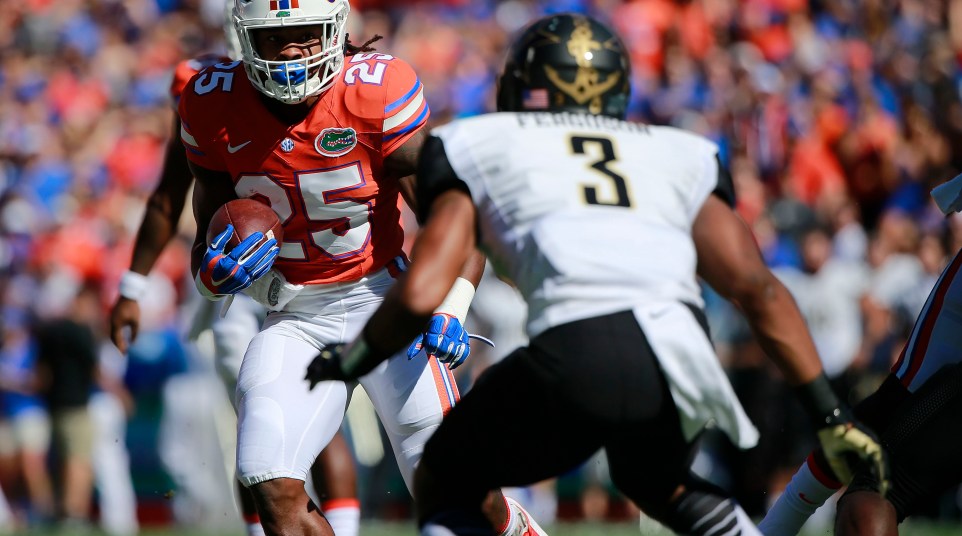
Gators have chance to reverse slide that started against Vanderbilt a year ago
GAINESVILLE, Fla. – When Florida’s 2015 season is talked about now, the focus is often on the disastrous finish. In the final three games against FSU, Alabama and Michigan, the Gators were outscored 97-24 and went from being considered a College Football Playoff contender to a fluke SEC East champion.
The truth is Florida’s post-Will Grier slide started long before the Seminoles kept the Gators out of the end zone at home; it started three weeks earlier against Vanderbilt. UF entered the game as 21-point favorites, but if not for a late field goal from Austin Hardin, it would have lost 7-6 to a team that finished the year 4-8.
The Gators tried to brush off the lackluster performance against the Commodores and celebrate the 9-7 victory that clinched the division title. Coach Jim McElwain identified the team’s mental approach as a problem that needed to be fixed.
“There were some guys that for some reason, and I will figure it out, I don’t think they answered the bell,” McElwain said in November 2015. “As they continued to kind of take it to us, I’m not sure we responded the way you should.”
History shows the Gators never quite figured it out — or at least couldn’t figure out how to fix it. Even after what should have been a wake up call against Vanderbilt, the Gators were taken to the wire by a South Carolina squad that finished 3-9 and lost at home to The Citadel. The following week, Florida needed overtime to beat FAU, which finished 3-9 overall and 3-5 in Conference USA.
Flash forward to last Saturday, and the Gators failed to “answer the bell” again. As Tennessee began to cut into a 21-0 deficit and eventually forged ahead 38-21, Florida looked lost. It was as if the team thought the game was over at halftime.
“I felt like we were a little lax,” RB Mark Thompson said of the team at halftime, according to Gator Country. “We didn’t have the same intensity that we had in the first half, and it showed.”
He wasn’t alone in that assessment.
“I think maybe as a team we got a little content that we were up 21-3 at the half,” Quincy Wilson told reporters in Knoxville. “We just, I don’t know, we just started feeling like we could get away with not doing what we were doing to win, to get up like we were up.”
Getting away with underperforming sure sounds like what we witnessed a year ago. It must especially be frustrating for the coaches. According to OL David Sharpe, the message at halftime on Saturday was to maintain the intensity of the first half.
“Just to keep our foot on the gas,” Sharpe said of the locker room message. “We were doing well. They were telling us the game definitely wasn’t over. Just to keep going, keep fighting.”
So how does a team learn how to finish a game? Sharpe pointed to the practice field.
“Just practice harder,” Sharpe said. “At the end of practice, it’s a long practice, you get tired and you start to ease up. We (have to) finish practice a little better, keep working hard.”
Sharpe might be on the right track, but the problem described by Thompson and Wilson sounds bigger than pushing oneself.
A year ago, the Vanderbilt game led to outsiders and critics doubting Florida as a legitimate contender. On Saturday, the Gators can use the game against the Commodores to show that the SEC East race isn’t over yet, and that they’re looking to contend for a division title and more.
They can do that by putting together a four-quarter effort toward a convincing win. And actually finishing the game regardless of the halftime score.
